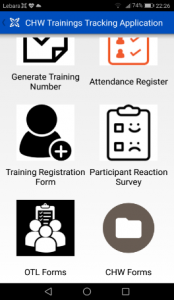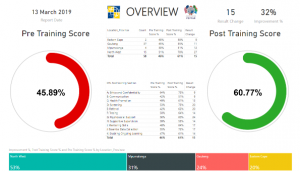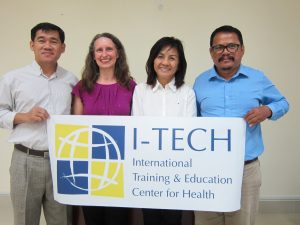I-TECH began supporting the implementation of pre-exposure prophylaxis (PrEP) as part of Namibia’s combination HIV prevention strategy in 2017. Continue reading “Pre-Exposure Prophylaxis for HIV Prevention in Namibia”
Author: baldwl
Facility-Based HIV Testing Services in Namibia
As a key component of I-TECH’s support to HIV care continuum strengthening in Namibia, I-TECH supports the Ministry of Health and Social Services in efforts to achieve the UNAIDS target of “90% of people living with HIV will have a known status.” I-TECH supports above-site HIV testing activities at region-and national-levels, as well as technical assistance and direct service delivery at the site-level across 78 facilities in 6 regions in Namibia.
I-TECH implements evidence-based HIV-testing strategies to maintain efficient programs while increasing HIV-positive yield including optimized provider-initiated testing and counseling (PITC) and index testing.
- I-TECH’s clinical and technical teams place emphasis on offering PITC to high-risk populations including STI patients, clients attending family planning services, presumptive and confirmed TB cases, and patients attending in-patient hospital services. In addition, efforts will be made to increase testing among men through the above strategies, as well as encouraging more flexible hours for HIV testing through extended hours of operation.
- I-TECH participates in the national-level index testing work group, helping to finalize paper tools and training materials for national deployment. At the site level, I-TECH strategic information staff ensure complete documentation of partner status of all enrolled patients, with testing offered to identified partners. I-TECH in Namibia is also working with I-TECH country offices across the network to leverage expertise in index testing training and monitoring and evaluation. I-TECH is currently supporting discussions at the national-level concerning the role of self-testing as an extension of services offered to facility-based clients, as another option for ensuring that more partners are tested.
I-TECH is currently supporting facilitation of stepped training for HIV recency testing in 5 high-volume districts in Namibia. Recency testing provides insight into the timeline of a client’s HIV infection. As Namibia approaches epidemic control, identifying, and targeting efforts and interventions to hard to reach populations most at risk for HIV acquisition will be essential.
Health and Wellness National Survey of Youth in Namibia
Since 2017, I-TECH worked closely with the Ministry of Gender Equality and Child Welfare, Ministry of Health and Social Services, UNICEF, Centers for Disease Control and Prevention, and the Namibia Statistics Agency to implement a nationally representative survey on youth experiences as well as HIV incidence and prevalence. Survey results will inform policy and practice to improve the overall well-being of children and young people in Namibia and further focus HIV prevention efforts.
Survey collaborators are in the process of data analysis with a final report expected in early 2020. I-TECH will continue to support these efforts as well as continue to work to strengthen HIV prevention and promote the overall well-being of youth in Namibia.
Determined, Resilient, Empowered, AIDS-free, Mentored, and Safe women (DREAMS) in Namibia
In 2017, I-TECH began the DREAMS program in Khomas and Zambezi regions. The DREAMS program aims to reduce HIV infections among adolescent girls and young women (AGYW) through a core package of evidence-based interventions across health, education, and social sectors. At a safe space such as a school or community center, participants meet with a mentor who is trained to deliver a curriculum focused on the prevention of HIV and gender-based violence (GBV). Mentors help AGYW build strong social networks and empower them to make healthy and positive decisions. AGYW can also access on-site services like HIV testing, family planning, PrEP, counseling, and screening for GBV to protect against HIV infection. I-TECH has supported over 150 safe spaces since its launch and enrolled over 20,000 AGYW in the program.
I-TECH also supports programming for caregivers through the Families Matter! Program, which promotes healthy communication between parents and AGYW around HIV and GBV topics. I-TECH works closely with the Ministry of Education, Arts, and Culture; Ministry of Gender Equality and Child Welfare; Ministry of Health and Social Services; Centers for Disease Control and Prevention; and other implementing partners.
Namibia Partnerships
I-TECH works with a wide variety of partners in Namibia. Partners include:
I-TECH Launches In-Service Skills Development Program for Health Workers in South Africa
In South Africa, the International Training and Education Center for Health (I-TECH) has begun facilitating an in-service skills development training program for community health workers (CHWs) and their supervisors in their roles on the Ward-Based Primary Health Care Outreach Team (WBPHCOT). To maximize the impact of this training, I-TECH is working with two PEPFAR District Support Partners across seven of South Africa’s nine provinces to reach an estimated 20,000 CHWS, which is approximately half of the country’s CHW workforce. Training began in February 2019 and will continue through September 2019.
The WBPHCOT In-Service Skills Development Package aims to strengthen the capacity of CHWs to provide high-quality health services in the community. The program emphasizes development of core, cross-cutting service delivery skills, including communication, screening, psychosocial support, ethics, and confidentiality that enable CHWs and their supervisors, known as Outreach Team Leaders (OTLs), to effectively carry out their work.
During training, CHWs and OTLs build their skills in both classroom and on-the-job settings using group discussions, case presentations, scenario-based role play, small group activities, and interactive presentations. Priority health conditions and related clinical topics are included, and the realistic scenarios cover all components of the CHW scope of work.

Leveraging Technology to Improve Training
All training data collected for the skills development program will be captured via a mobile application and stored using the CommCare platform, a mobile data collection system developed by Dimagi. The app allows I-TECH access to real-time data, which can inform targeted measures to ensure that all CHWs are receiving high-quality trainings.
To tailor the program to the needs and realities of the field, I-TECH has implemented a blended tablet and paper-based data collection approach.
“There is such a large number of CHW trainees in the field that using this blended approach allows the OTLs to dedicate their time to training CHWs rather than focus on paperwork,” says Ilyse Jacobson, I-TECH South Africa Technical Director of Programs. “This flexibility allows for more in-depth and efficient training.”

Due to its role as the sole repository for all training-related data, the CommCare database will also generate reports linked to an interactive stakeholder dashboard.
“The dashboard not only brings I-TECH’s data visualization and dissemination approach into the 21st century,” says Jacobson, “it allows project stakeholders access to the data that helps with decision-making both in and outside of this program.”
The design of the Stakeholder Dashboard allows donors, implementing partners, and the National Department of Health to track current progress against training targets on a weekly basis.
Using Data to Improve Health Service Delivery in Malawi
The Kuunika Project: Data for Action was a four-year program implemented by a consortium of organizations, including the International Training and Education Center for Health (I-TECH), that began in 2016 to improve healthcare service delivery through the effective use of data. Consortium activities aimed to improve data systems, data use, and data governance in five districts throughout Malawi. I-TECH’s main focus was to build the capacity of healthcare workers (HCWs) to access, manage and use health data in high-burden HIV/AIDS facilities and communities.
I-TECH conducted an HCW training needs assessment with support from the Ministry of Health (MOH) in 2017. Using the assessment data, I-TECH collaborated with MOH, district health teams, local university representatives, and subject matter experts to design and develop a training curriculum that was piloted in 2018.
In January 2019, I-TECH rolled out a national training comprised of seven-day, in-person workshops and complementary eLearning modules with the goal of establishing a culture of data use, a strong base of high-quality data, and improve the availability of high-quality information to decision makers with the ultimate goal of improving health outcomes. The eLearning program, Building Effective Health Information Systems, is comprised of seven modules that introduce frontline healthcare workers and managers to health information systems. The modules include:
- Introduction to Health Information Systems
- Health Information Systems: Data Management Concepts
- Using EMR Data for Decision Making
- Improving and Maintaining the Quality of EMR System Data
- Logic Models and System Classification
- Overview of System Architecture
- Introduction to Interoperability at the Facility Level.
An average of 150 HCWs per district were trained for an overall total of more than 800 HCWs trained across the country.
In May 2019, I-TECH launched a mentorship program designed to bridge the gap between training and practice, and to help participants apply their newly gained knowledge on the job. By the end of Phase 1, the I-TECH team had oriented over 100 district mentors to the mentorship program and tools. I-TECH’s role in the consortium concluded in August 2019 when Phase 1 of the Kuunika Project ended.
Laboratory Quality Stepwise Program in Cambodia
From September 2013 to September 2016, I-TECH conducted an implementation science research project to improve laboratory quality in Cambodia. The primary objective of the project was to implement a mentored laboratory quality stepwise implementation (LQSI) program to strengthen the quality and capacity of Cambodian hospital laboratories. As a result, target laboratories improved their operations in the areas of: biosafety, organization, personnel, equipment maintenance, purchasing and inventory, testing accuracy, process management, documentation and communication.
The project recruited and trained four laboratory technician to be mentors, training staff from 12 referral hospital laboratories in quality management systems (QMS), and reinforcing skills acquisition through in-person mentoring. Participating laboratories reported a 36% increase in quality management, 29% improvement in data management, and 25% improvement in specimen collection and handling. The laboratories established the foundational practices of a QMS, and the LQSI program has improved the recognition of the laboratory within the hospitals.
Improving Laboratory Quality in Cambodia

I-TECH’s laboratory program began in Cambodia in 2013 with the goal to improve operations and regional biosurveillance and biosecurity through improved laboratory quality assurance and management practices. In collaboration with the Cambodian Ministry of Health, the World Health Organization (WHO), and the U.S. Centers for Disease Control and Prevention (CDC), and with funding provided by the Department of Defense and DTRA, I-TECH strengthens the Cambodian laboratory system through:
- Implementation of an intensive mentoring program at 12 national and provincial public health laboratories;
- Leadership and management capacity building of MoH laboratory leaders;
- Mentoring and capacity building the National Animal Health and Production Research Institute (in collaboration with Washington State University);
- Job specific training delivered in service and through educational programs such as the Quality Assurance Certificate Course (in collaboration with the University of British Columbia);
- Support for laboratory workforce development through on-site technical assistance and training;
- Support for national laboratory system policy development.
Enhancing Quality of Healthcare Activity in Cambodia
The overall goal of the Enhancing Quality of Healthcare Activity (EQHA) program in Cambodia is to improve the quality of public and private health services in national and sub-national health systems by August 2023. The project, funded by the US Agency for International Development (USAID), is being implemented by Family Health International (FHI360) in collaboration with I-TECH and other partner organizations. I-TECH’s scope of work focuses on improvements to 1) the national health policy regulatory framework and 2) national pre-service health education and training institutions.
Continue reading “Enhancing Quality of Healthcare Activity in Cambodia”